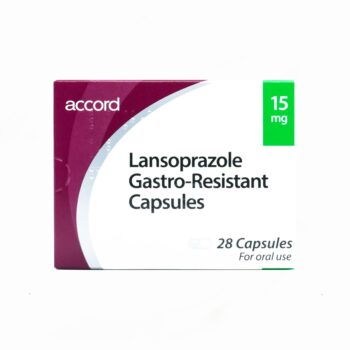What Are Omeprazole Capsules?
Omeprazole capsules belong to a group of medications called proton pump inhibitors (PPIs). They reduce the amount of acid the stomach produces, which helps relieve symptoms of acid reflux, ulcers, and other conditions.
What Are Omeprazole Capsules Used For?
Doctors prescribe Omeprazole to treat several conditions caused by excess stomach acid, including:
— Gastro-Oesophageal Reflux Disease (GORD) – a condition where stomach acid flows back into the oesophagus, causing heartburn and discomfort.
— Stomach and duodenal ulcers – helps the stomach and small intestine heal and reduces the risk of ulcers returning.
— Helicobacter pylori infections – taken with antibiotics to kill the bacteria and stop ulcers from coming back.
— NSAID-related ulcers – prevents and treats ulcers caused by long-term use of non-steroidal anti-inflammatory drugs (NSAIDs).
— Zollinger-Ellison Syndrome – a rare condition that causes excessive stomach acid due to a pancreatic growth.
— Suitable for adults and children for specific conditions.
How Do Omeprazole Capsules Work?
Omeprazole blocks proton pumps in the stomach lining, which control acid production. By lowering acid levels, it allows the oesophagus and stomach to heal from irritation or ulcers.
How Should Omeprazole Capsules Be Taken?
— Take it once daily, preferably in the morning.
— You can take it with or without food.
— Swallow the capsule whole with a glass of water—do not crush or chew it.
— If swallowing is difficult, open the capsule and mix the contents with water or juice. Drink it immediately.
Are There Any Side Effects?
— Common side effects include headaches, nausea, diarrhoea, constipation, bloating, or stomach pain.
— Less common side effects may cause dizziness, sleep disturbances, or a skin rash.
— Rare but serious side effects include liver problems, severe allergic reactions, or skin conditions such as Stevens-Johnson Syndrome.
— Contact a doctor if symptoms persist or become severe.
What Warnings and Precautions Should Be Considered?
— Avoid Omeprazole if you are allergic to it or other PPIs.
— Long-term use may reduce vitamin B12 levels or increase the risk of bone fractures.
— Speak to a doctor if you have liver disease, as adjustments may be necessary.
— Omeprazole may interact with certain medications, such as blood thinners, antifungals, and HIV treatments, so check with a doctor before taking it.
How Should Omeprazole Capsules Be Stored?
— Store below 25°C in a dry place.
— Keep out of reach of children.
— Do not use after the expiry date.

